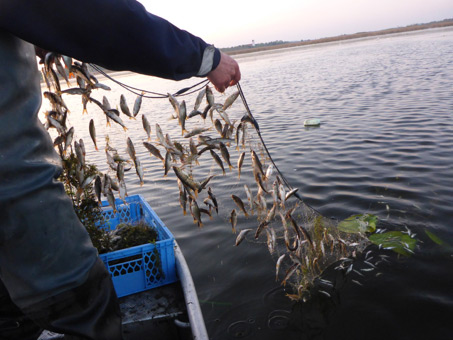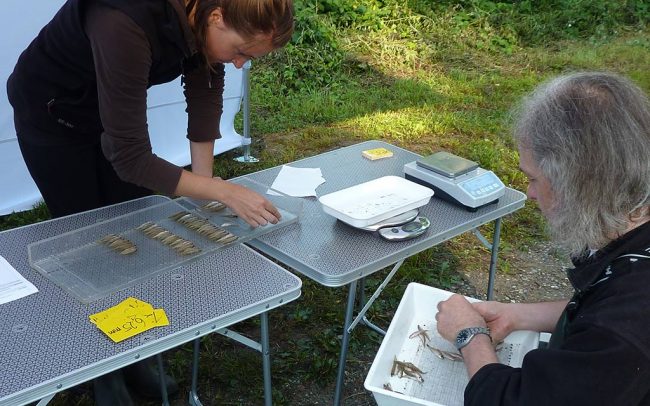
L12: Development and application of methods for the assessment of fish communities in large and deep lakes
The aim of this project is to develop an effective and standardised fish monitoring protocol for Lake Constance (building on the 2014 assessment).
Standardized fish monitoring protocol for large and deep lakes.
- reliable fish fauna assessment
- minimized fish mortality
- logistically and financially feasible
The European Standard CEN (Comité Européen de Normalisation) recommends a randomised stratified sampling protocol using multi-mesh gillnets. However, the required high number of nets in large and deep lakes leads to an immense fishing effort. In addition, mass catches, which often occur when using smaller mesh sizes, cause an unnecessarily high fish mortality. As a result, such a sampling protocol is not suitable for regular monitoring in Lake Constance.

Schematic fish sampling. Benthic and pelagic multi-mesh gill nets are exposed across all depth in the lake. Electric fishing sampling close to the shore, trawling net sampling or other methods are used in addition to attain a holistic result.
Reduce net number (without loss of habitats and rarely caught length classes)
Habitat-specific net positions?
Enlarging net area of specific mesh sizes?
Reduce mass catches
Reducing net area of specific mesh sizes?
Optimize protocol
Using multi-method design?
By performing an intensive fish sampling in Lake Constance and comparing the results of the randomised standard sampling according to CEN (Comité Européen de Normalisation) with effort-reduced protocols, the research questions listed will be addressed.
Modifying the sampling approach ensures a reliable and regularly performed monitoring of fish fauna. This modified assessment should account for the horizontal as well as vertical fish distribution across the whole lake, while minimising fish mortality and being logistically and financially feasible. In this context, various options for reducing the number of nets, modifying the net design and complementing the net fishing using additional methods will be tested in a large-scale intensive fishing campaign.
Findings regarding the methodology as well as population dynamics in the lake will significantly contribute to the development of an ecologically worthwhile and sustainable biodiversity management of Lake Constance.

Project team
 M.Sc. Barbara Scholz – scientist (alumna)
M.Sc. Barbara Scholz – scientist (alumna)

Picture 1: Mass catches, often occurring when using smaller mesh sizes, as shown in this example from the Federsee, should be reduced.
Picture 2: Caught fish are measured and weighed.

Fisheries Research Station Baden-Württemberg (Fischereiforschungsstelle Baden-Württemberg, FFS) of the Agricultural Centre for Cattle Farming, Grassland Management, Dairy Farming, Game and Fisheries Baden-Württemberg (LAZBW), Germany

Downloads
Scholz B & Gugele S (2018)
Seewandel und RTG – zwei Forschungsprojekte für den Bodensee im globalen Wandel.
Aquakultur- und Fischereiinformationen aus der Fischereiverwaltung (Informationsschrift der Fischereiforschungsstelle, des Fischgesundheitsdienstes und der Fischereibehörden des Landes Baden-Württemberg) Rundbrief 1/2018.




